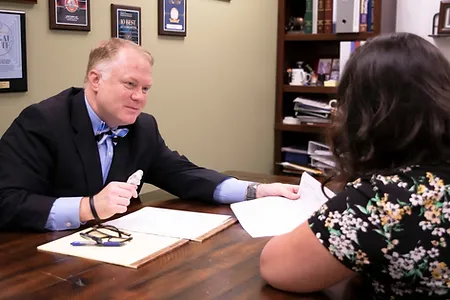
At what age do my kids get to decide who they live with?
Parents in custody disputes often ask me “How old do my kids have to be to decide who they live with?” The simple answer to that question is that they do not get to decide. If parents can’t agree on that issue and end up in Court, a Judge will make that decision. But let’s explore a slightly different question: “When and how will a judge consider the opinions and preferences of my child?” And that’s a great question with an interesting and fairly complicated answer. Let’s talk about it.
The North Carolina custody statute does not contain any provision that specifically addresses this issue. However, decisions by North Carolina appeals courts have established that trial Courts have discretion on the issue of the testimony of children in custody cases. And the cases addressing that issue have established that once a child reaches the age of 10 or more, an appeals court is probably not going to overturn the decision of a trial court to allow the child of such an age to testify. Moreover, the older a child gets the less likely it is that there will be any barrier to considering the testimony of the child. Does this mean that a judge has to allow a 10-year-old to testify? No. But it does mean that a judge is free to allow such testimony. And because that is the case, most judges will allow some sort of testimony from children to be considered once a child reaches the age range of 10-12 years old, and almost all judges will consider the testimony of kids who are age 13 or older.
Does that mean that a 10-year-old child will be allowed to testify on a witness stand in a custody hearing or trial? That usually will not happen due to another option that exists. Judges are allowed to question a child outside of the courtroom, usually in the judge’s “chambers” (which is an old-fashioned term that basically means the same thing as an office), and usually with only the attorneys for the parties present to observe the questioning. It’s very important to understand the rules for how an in-chambers interview is allowed to occur. North Carolina appellate caselaw establishes that an in-chambers interview, which occurs outside the eyeshot and earshot of the parents, can only occur if BOTH of the parents agree for that to happen. If both parties agree to the in-chambers interview, caselaw requires that the Judge allow the attorneys to be present for the interview to at least observe. The Judge may allow the attorneys to also ask the child questions. If both parents agree, the Judge may conduct the in-chambers interview one-on-one with the child, without the attorneys present. It’s been my experience that a one-on-one meeting between the judge and the child is the most effective method for accurately securing the opinions and preferences of a child, but again, that can only occur if both sides agree.
The North Carolina custody statute does not contain any provision that specifically addresses this issue. However, decisions by North Carolina appeals courts have established that trial Courts have discretion on the issue of the testimony of children in custody cases. And the cases addressing that issue have established that once a child reaches the age of 10 or more, an appeals court is probably not going to overturn the decision of a trial court to allow the child of such an age to testify. Moreover, the older a child gets the less likely it is that there will be any barrier to considering the testimony of the child. Does this mean that a judge has to allow a 10-year-old to testify? No. But it does mean that a judge is free to allow such testimony. And because that is the case, most judges will allow some sort of testimony from children to be considered once a child reaches the age range of 10-12 years old, and almost all judges will consider the testimony of kids who are age 13 or older.
Does that mean that a 10-year-old child will be allowed to testify on a witness stand in a custody hearing or trial? That usually will not happen due to another option that exists. Judges are allowed to question a child outside of the courtroom, usually in the judge’s “chambers” (which is an old-fashioned term that basically means the same thing as an office), and usually with only the attorneys for the parties present to observe the questioning. It’s very important to understand the rules for how an in-chambers interview is allowed to occur. North Carolina appellate caselaw establishes that an in-chambers interview, which occurs outside the eyeshot and earshot of the parents, can only occur if BOTH of the parents agree for that to happen. If both parties agree to the in-chambers interview, caselaw requires that the Judge allow the attorneys to be present for the interview to at least observe. The Judge may allow the attorneys to also ask the child questions. If both parents agree, the Judge may conduct the in-chambers interview one-on-one with the child, without the attorneys present. It’s been my experience that a one-on-one meeting between the judge and the child is the most effective method for accurately securing the opinions and preferences of a child, but again, that can only occur if both sides agree.
Continue learning in Child Custody Questions – Part 3 >
Follow from the beginning in Part 1 about Child Custody in North Carolina >

